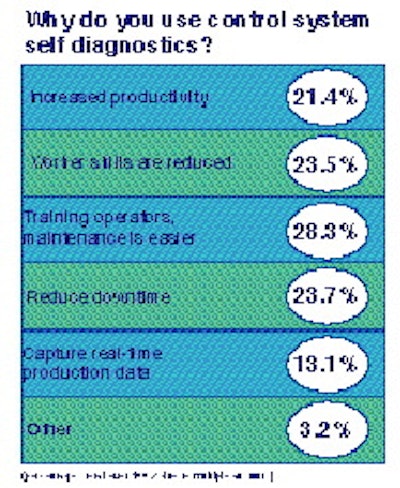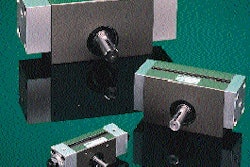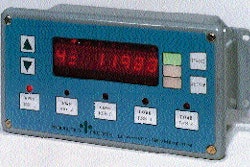From video displays to software language, electronics are playing an ever larger role in the operation of packaging equipment. Research conducted by the Packaging Machinery Manufacturers Institute for the '95 Packaging Productivity Indicator affirms the depth of this trend, and measures just which packaging titles are responsible for understanding electronic controls. The conclusions and charts presented here result from an analysis of both the Trends Indicator Executive Summary and the original data from which it was assembled.
Just a bit over half of the 434 respondents say they feel that line operators are keeping up with advances in electronic controls (Chart 1). An eight-page detailed survey was mailed by consultant Industry Insights, Inc., to 6귔 users of packaging machinery last summer. Of the respondents, 31.5% said their primary industry was food, and another 6.4% said beverages. About 18% came from the pharmaceutical/medical area, and just under 6% from beauty and cosmetics. A total of 77 respondents selected the "other" category from the list of industries presented.
It's probably not surprising that packagers in the electronics business say their line operators are qualified, at nearly 82%; however, only 3.1% of all survey participants said they were in electronics packaging. On the other end of the scale, packagers of beverages say their operators are least likely to handle advances in electronic controls. In fact, some 69% of them say their operators are unqualified.
Of the largest number of responses, the food industry, 57% say they're confident that their operators are up to date. Meanwhile, the second biggest group of respondents, in pharmaceutical/medical packaging, is evenly split on the issue. Possibly the biggest surprise is that almost two-thirds of respondents in beauty and cosmetics packaging feel their line operators are qualified to deal with electronic controls.
The PMMI Productivity questionnaire also asked about control standardization in packaging lines. It asked about controls specifications for an integrated new packaging line (Chart 2). Although this question was answered by just about two-thirds of all respondents, only 21% say they specify a single language throughout the line; over 42% say no single language is required.
Similarly, just a bit over one-fifth specify a single manufacturer for controllers throughout the line (Chart 3). Another 16% say they prefer to use a single integrator to coordinate machinery logic software. That single integrator is favored most by electronics packagers (37.5%); but only 5.6% of beverage packagers prefer to use a software integrator.
Food industry respondents were most likely to specify a single language (28%), while 38% of beverage packers say they specify uniform controllers throughout the line.
Video displays not yet common
Although many of the new machinery you see reviewed in Packaging World talk up their video display controls, most packagers queried by PMMI still don't have them in operation (Chart 4).
Just 21% of all respondents say they use them now, compared to 51% who say they use no video displays in their operations. They're most likely to be found in the food industry (32.5%) or in lines packaging nonfood household products (33%). They're least likely to be found in packaging chemicals (77% don't use them) and in plants packaging electronic products (just 10% say they have them).
In the second part of this question, packagers were asked whether they require control systems to have self-diagnostic capabilities. The respondents may have been unclear about how to respond because fewer than one-third answered the question, and the answers vary widely by industry. Overall, 13% say they require self-diagnostics, 16% say they don't.
Most food packers responding say their companies require self-diagnostics. Some 13% say yes, about 8% say no. Among beverage packers, 27% require diagnostics while 7% say no.
For those respondents whose companies use self-diagnostic controls, the reasons are varied (Chart 5). Over 28% of all respondents say they use the self diagnostics because they make training easier for operators and mechanics. About 24% say the primary reason is that they see reduced downtime on the line.
Almost the same number admit that operator skills in problem solving have deteriorated. Over 21% say this control feature provides increased productivity, and 13% use them primarily to capture real-time production data to aid problem-solving.
Who troubleshoots controls?
Finally, the research on controls asked which job titles were either capable or incapable of handling machine logic and controls problems (Chart 6). Respondents were asked to select capability in a range from one to five, from most to least capable. In our chart, we include only the two highest (very and somewhat capable) and lowest (somewhat incapable and not at all capable) answers.
Not surprisingly, plant electricians and engineers led the list, with about three-quarters of participants calling them capable, and fewer than 8% rating them incapable. Supervisors and foremen (47%) scored nearly as high as plant maintenance (52%). Ironically, plant management scored about the same, 35% capable and 36% not capable.
When you examine the industry responses, there are some unusual answers. For example, fewer than 5% in nonfoods household products felt engineers were incapable. Nearly 13% of respondents in the beverage industry said the same. However, beverage packers rated supervisors and foremen much more qualified to handle control problems. Only 7.7% of respondents said they felt these workers were incapable.
Maintenance people got high marks in handling controls except for respondents in the chemical industry. Over 29% rated maintenance people incapable. Electricians had a predictably high ranking, but 15% of those in the chemical industry said their electricians were incapable of handling controls problems.
Needless to say, these results represent just one small part of the PMMI Packaging Productivity Trends Indicator survey. The complete survey is available for $295; six audio tapes of the Productivity Forum cost $125; with the survey, $400.


























